 Petzlover
Petzlover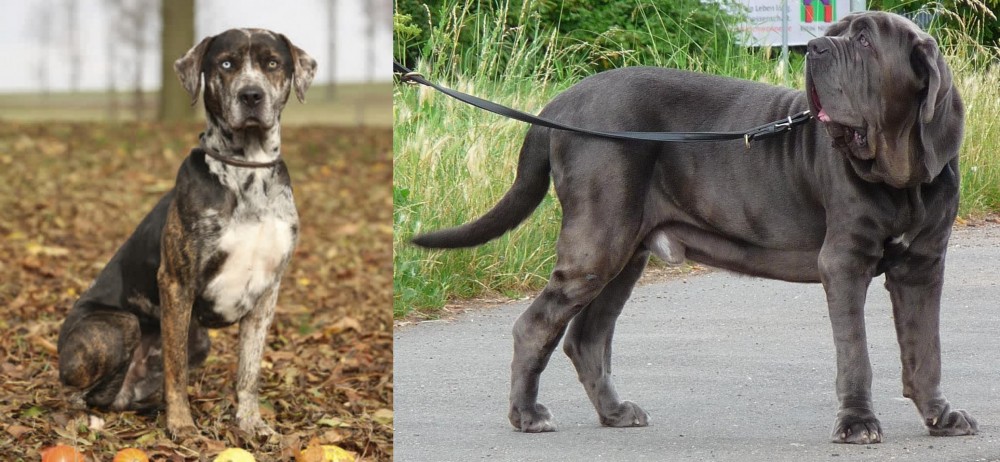 Catahoula Leopard is originated from United States but Neapolitan Mastiff is originated from Italy. Both Catahoula Leopard and Neapolitan Mastiff are having almost same height. Catahoula Leopard may weigh 31 kg / 68 pounds lesser than Neapolitan Mastiff. Catahoula Leopard may live 5 years more than Neapolitan Mastiff. Both Catahoula Leopard and Neapolitan Mastiff has same litter size. Catahoula Leopard requires Low Maintenance. But Neapolitan Mastiff requires Moderate Maintenance
Catahoula Leopard is originated from United States but Neapolitan Mastiff is originated from Italy. Both Catahoula Leopard and Neapolitan Mastiff are having almost same height. Catahoula Leopard may weigh 31 kg / 68 pounds lesser than Neapolitan Mastiff. Catahoula Leopard may live 5 years more than Neapolitan Mastiff. Both Catahoula Leopard and Neapolitan Mastiff has same litter size. Catahoula Leopard requires Low Maintenance. But Neapolitan Mastiff requires Moderate Maintenance
 This working dog breed originates from America’s Deep South. In fact it was originally named after a small village in the state of Louisiana and was made the state’s official dog in 1979. The dog is believed to have come from the Mastiff and Greyhound.
This working dog breed originates from America’s Deep South. In fact it was originally named after a small village in the state of Louisiana and was made the state’s official dog in 1979. The dog is believed to have come from the Mastiff and Greyhound.
Known as war dogs they were left with local tribes who crossed them with wolves, and French Beauceron blood was also included.
A number of Catahoula dog Associations were started and the Louisiana Catahoula Cur Association was formed in 1976, followed by others. These Associations work to promote the breed. In 1995 the United Kennel Club was the first national dog registry to recognize the Catahoula.
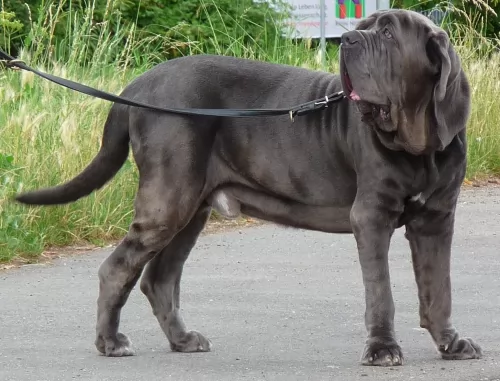 An ancient breed, the Neapolitan Mastiffs are massive dogs with a history of protecting their family and their property. The breed has deep rooted protective instincts and they are very frightening in appearance. The Neapolitan is of the Molosser group of dogs, all of whom probably came from the same line. It is known that all the mastiffs in Europe are descendants of the Tibetan Mastiff. The Tibetan Mastiff is considered the most ancient of all canines.
An ancient breed, the Neapolitan Mastiffs are massive dogs with a history of protecting their family and their property. The breed has deep rooted protective instincts and they are very frightening in appearance. The Neapolitan is of the Molosser group of dogs, all of whom probably came from the same line. It is known that all the mastiffs in Europe are descendants of the Tibetan Mastiff. The Tibetan Mastiff is considered the most ancient of all canines.
The Asian Mastiffs came from India to Greece around 300 BC with Alexander the Great. Then the breed was brought to the Romans by the Greeks and then introduced them in their circus in fights. Another possibility is that around 500 BC the mastiffs came to Britain from the Phoenicians. Either way the Roman Molossus is the ancestor of the Neapolitan Mastiff.
The Romans crossed the breed with the English Mastiff around 55 BC and developed a premiere war dog that was called a Mastini.
The breed eventually became extinct in Europe with the exception of Campania. The breed was recognized in 1946 with the standard accepted in 1949. However, it is believed that the Neapolitan Mastiff has been continuously present in Campania for over two thousand years. The breed was initially developed as war dogs and for the Roman coliseum spectacles.
In 1946 Dr. Piero Scanziani established a program to breed them in Italy. He wrote the breed standard in 1949.
Today the Neo is a farm dog, an army dog, a police dog and a guard dog. They were shown in Italy for the first time in 1946 but only in 2004 was the breed recognized by the American Kennel Club (AKC). It was 1973 when the Neapolitan Mastiff Club of America was born and 1996 when the standard was approved by the AKC. They are still a rare breed in the United States.
 Known as the Leopard dog because of the distinctive spotted patches on his short to medium length coat, this interesting looking spotted dog can have a coat of many colors such as solid colors, brindle and a blend of several colors including blue merle and red merle, black and tan.
Known as the Leopard dog because of the distinctive spotted patches on his short to medium length coat, this interesting looking spotted dog can have a coat of many colors such as solid colors, brindle and a blend of several colors including blue merle and red merle, black and tan.
He is a muscular and athletic dog of medium to large size with sturdy legs and deep chest. He stands at 56 – 68cm and weighs 20 – 50kg. Many of these dogs have webbing between the toes which gives them an advantage when running through marshy areas or when swimming.
With his floppy ears, the tail is long or bobtailed. An unusual aspect with the dog is his eyes – having what is known as marbled glass eyes which are blue or blueish-white in color.
The Catahoula Leopard Dog can be stubborn and he is also energetic, fearless and highly intelligent. You’ll want to have him trained and socialized early as then he becomes a more relaxed, obedient dog. He is an assertive dog but not aggressive by nature.
Catahoulas in general are even tempered and they are willing to share their space with children in the home as well as other pets. They are protective of children and of their entire human family, making good watchdogs.
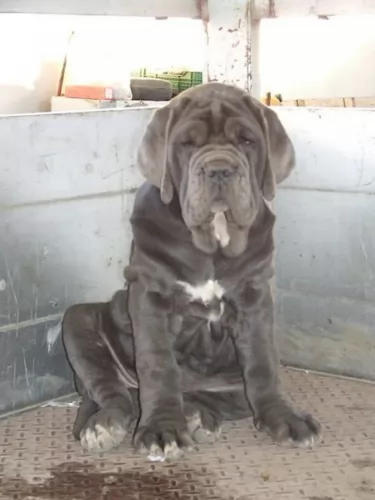 The Neapolitan Mastiff is a massive dog , so powerful and very intimidating in his looks. With an incredibly large head and hanging folds and wrinkles, the Neo is an impressive animal. His inner nobility and dignity is evident in his stance and the way he holds himself. He is relaxed, calm, quiet yet imposing none the less. His coat is dark whether black, tawny, gray or mahogany. He is muscular beyond imagination. The Neo is 10-15% longer than he is tall.
The Neapolitan Mastiff is a massive dog , so powerful and very intimidating in his looks. With an incredibly large head and hanging folds and wrinkles, the Neo is an impressive animal. His inner nobility and dignity is evident in his stance and the way he holds himself. He is relaxed, calm, quiet yet imposing none the less. His coat is dark whether black, tawny, gray or mahogany. He is muscular beyond imagination. The Neo is 10-15% longer than he is tall.
On his massive head his eyes are deep set and covered by his eye lids that droop. His eyes are blue as puppies then dark and coordinated with his coat. and his nose is large and the color of his coat. Ears are natural or can be cropped, and they carry their tail straight and curving back. The Neo has round paws and arched toes.
 The Catahoula makes a fine family pet but he is a dog which shouldn’t be left outside day after day. He is a companion dog and won’t thrive without the companionship of his human family.
The Catahoula makes a fine family pet but he is a dog which shouldn’t be left outside day after day. He is a companion dog and won’t thrive without the companionship of his human family.
He is highly intelligent and also energetic, and if you want him to be relaxed and amicable around other humans and pets in the home he will require training and socialization. For training and ownership, the Catahoula Leopard will require a strong, firm, confident personality and he’ll be an obedient, loving and loyal companion.
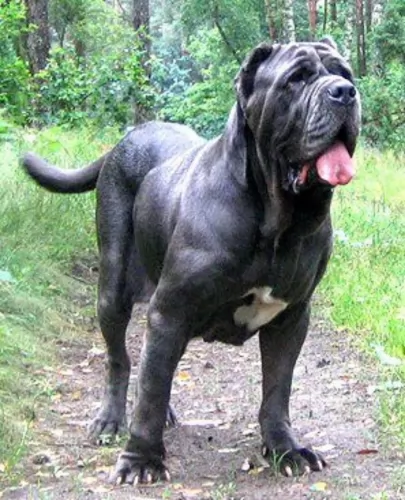 Older children in their family. No toddlers or strangers.
Older children in their family. No toddlers or strangers.
Protective yet quiet, calm, relaxed
No they won’t adapt well to apartment living or to strangers.
They are intelligent and trainable but must be socialized and know the human is the alpha or they will take over.
 Your Catahoula Leopard is a healthy dog breed and with good care he can live to be 10 to 14 years of age. However, there are a number of reasons why some of the healthiest dogs can become ill.
Your Catahoula Leopard is a healthy dog breed and with good care he can live to be 10 to 14 years of age. However, there are a number of reasons why some of the healthiest dogs can become ill.
Knowing about these illnesses means you can take action and minimize the pain and suffering your pet might have to otherwise endure.
You’ll notice your pet shaking his head and maybe even scratching his ears. Ear infections are more evident in dogs with floppy ears and there can be an ear discharge. When left untreated, the ears can become painful and then it is time to get him to the vet.
This is a common illness in dogs and can be terribly uncomfortable and debilitating for your pet as he tries to urinate all the time with no success. Signs of UTI can include this excessive urination with little urine coming out, lethargy and discomfort. Take your pet immediately to the vet to be checked over.
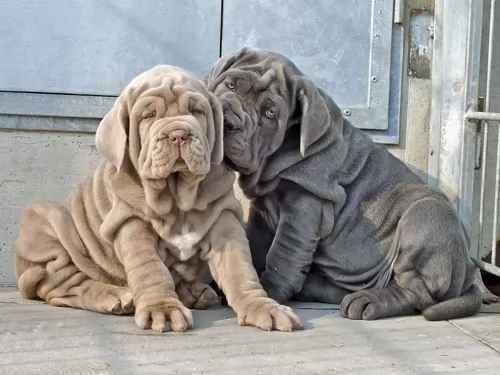 The Neapolitan Mastiff is prone to many of the same issues as any massive, extra large breed. The most common of these is Cherry Eye.
The Neapolitan Mastiff is prone to many of the same issues as any massive, extra large breed. The most common of these is Cherry Eye.
 A dog makes such a splendid pet, willing to give loyal and loving friendship to humans, even those who don’t treat him properly. When you think of the unconditional love your Catahoula Leopard dog will give you, surely you want to provide him with good food and shelter.
A dog makes such a splendid pet, willing to give loyal and loving friendship to humans, even those who don’t treat him properly. When you think of the unconditional love your Catahoula Leopard dog will give you, surely you want to provide him with good food and shelter.
It can be devastating if your dog goes missing, and if he has no identification, to find him might only mean telling people what he looks like. Rather put a collar on him and an ID tag so that your chances of getting him back are just that much better.
You can also have him micro-chipped by your veterinarian and these chips have a unique code which can provide useful information on your pet.
Make sure that your pet is vaccinated as a puppy against diseases which could be deadly such as rabies.
If you have no intention of allowing your Catahoula Leopard to have puppies, rather have him neutered or spayed if its a female. It is better for them and they can live longer and be free of some ailments that at un-spayed or un-neutered dog may get.
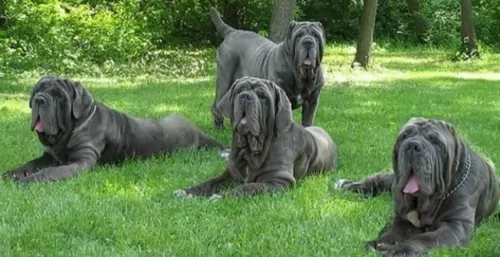 Neapolitans grow fast and so don’t overfeed when they are young. Lower protein and higher fat content.
Neapolitans grow fast and so don’t overfeed when they are young. Lower protein and higher fat content.
Don’t overfeed the adult as they can become obese.
This big hearty breed needs exercise but not too much. They overheat easily. The puppy will push himself, so you have to make sure he doesn’t over do it. No tug of war games. They need a long walk twice every day.